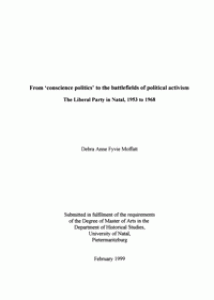Related Collections from the Archive
Related content
This thesis examines the ways in which the Liberal Party - the Natal Division in particular attempted to become an effective political force in South Africa. The Party was formed in May 1953 as a non-racial political party . Initially, it concentrated on working among the white electorate, and on achieving political change through parliamentary means. The Party gradually
shifted its attention to the voteless black majority, and took its active opposition beyond the boundaries of parliamentary politics . Members of the Natal Division played a leading role in this shift. The party gave expression to a distinctive strand of radical liberalism, within a broader spectrum of South African liberalism. The Party was unsuccessful in preventing the entrenchment of the apartheid policies it so vehemently opposed. However, the Natal LP succeeded in developing a good working relationship with Congress Alliance, especially the African National Congress, in the region, in attracting a large number of black members
through its grass-roots involvement, and in keeping liberal principles and priorities in the public eye in inauspicious circumstances. From 1960, Party leaders attracted increasing government persecution for their anti-apartheid activism. The Party deserves more attention than is commonly given to it in the South African historiography of resistance politics. The Liberal
Party's continued existence as a non-racial political party was rendered impossible by government legislation in 1968. The Party disbanded, rather than compromise its non-racial principles.
